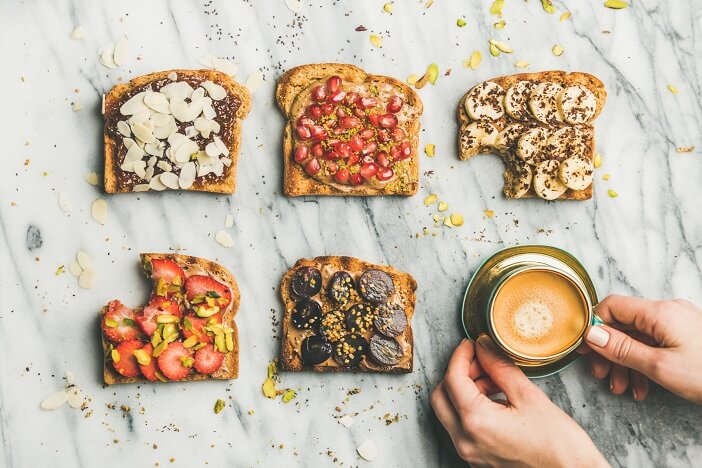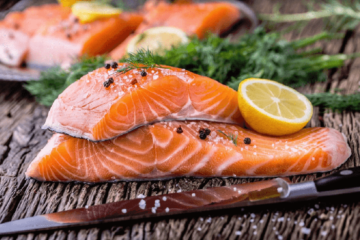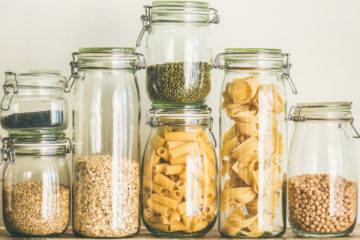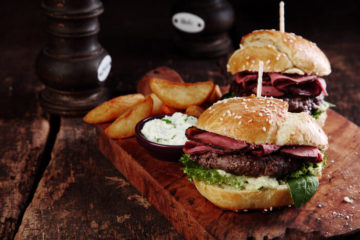Natural appetite suppressants – The best foods to ward off snack attacks

There is a very fine line between hunger and appetite, making it easy to confuse the two. Who isn’t familiar with that feeling of regret shortly after impulsively snacking? However, there are very simple ways to reduce your appetite for nutrient-poor, high-calorie foods and thus ward off unwanted weight gain.
We’ll show you a number of different natural appetite suppressants that you can effortlessly integrate into your everyday life.
How does appetite arise?

If we did not get an appetite for food, eating it, would in fact, be quite boring. It is only through our desire for certain foods that food gains an emotional element, which allows us to feel pleasure and comfort when we eat.
Appetite can occur independently of hunger.
Hunger and appetite both arise in the brain, but from different centres: the hunger centre is located in the hypothalamus, while the appetite centre can be found in the limbic system. You can read all about the underlying psychological mechanisms here.
Appetite, unlike hunger, can be present even without an energy deficit since it is mainly activated by our sensory perceptions. By nature, almost everyone prefers sweet foods and avoids bitter foods. All other individual preferences develop throughout the course of a person’s life due to many different influences – this is how appetite is acquired.
Resisting the countless delicious temptations available to us every day seems to be an unsolvable problem for many people – however, there are very easy ways to minimise the control that appetite holds over you. We will present you with many different food groups that can curb your appetite in a natural way – nature’s very own weight loss pills!
Find more tips and tricks on how to tame your appetite in our coach article about food cravings.
Synthetic vs Natural Appetite Suppressants
| Synthetic appetite suppressants | Natural appetite suppressants |
|---|---|
| Chemically produced slimming products in the form of tablets, powders, drops, etc. | Unprocessed foods of plant or animal origin |
| Numerous possible side effects | No health risk (barring allergies/intolerances) |
| Examples: phentermine, fenfluramine, orlistat | Examples: lentils, eggs, apples, nuts |
Promises of effortless and rapid weight loss make synthetic appetite suppressants seem, to many people, like a convenient means of progressing towards their goal. However, they carry with them several dangerous side effects (heart valve damage, high blood pressure, risk of addiction) that are all too often ignored. Natural appetite suppressants, on the other hand, contribute to a healthy metabolism, natural appetite regulation and weight loss that will last much longer. Therefore, if possible, one should always opt for natural appetite suppressants.
Natural appetite suppressants aren’t only healthier – they’re cheaper too!
Who can take natural appetite suppressants?
Since natural appetite suppressants are simple, unprocessed foods, in principle, everyone can benefit from them. This means you can integrate these foods (listed below) into your family meals with a clear conscience! In the presence of specific diseases or intolerances, problem food(s) should of course be excluded. Synthetic appetite suppressants, on the other hand, can be very harmful for certain groups of people beyond the usual side effects. These include, for example, unborn babies, children or people with metabolic disorders. For this reason, special care should be taken with synthetic appetite suppressants.
The top 10 natural appetite suppressants
- Wholegrain cereals & legumes (e.g. oatmeal, lentils, chickpeas) contain a lot of insoluble fibre, which delays the emptying of the stomach and thus makes you feel full for longer
- High-fibre fruits & vegetables (e.g. apples, carrots, artichokes) contain a lot of soluble fibre, which makes the stomach contents more voluminous thanks to its ability to swell up enormously, facilitating a stronger feeling of satiety
- Protein-rich foods (e.g. lean meat, eggs, soy products) require more calories than carbohydrates or fats in order to be digested and release important satiety hormones
- Fatty fish (e.g. salmon, tuna, herring) contains polyunsaturated omega-3 fatty acids, which cause the release of appetite-suppressing hormones
- Nuts (e.g. almonds) contain both high-quality fatty acids and fibre, both of which are involved in prolonging satiety
- Seasonings and spices (e.g. vanilla, mint) suppress appetites partly due to their fragrance, but also due to the essential oils they contain
- Spicy substances (found in e.g. ginger, chili, cayenne pepper) such as capsaicin or gingerol stimulate metabolism and digestion and also allow you to feel full sooner
- Caffeine (found in e.g. coffee, mate, guarana) is a natural appetite suppressant, as long as it is not consumed as a sugary drink
- Citrus fruits (e.g. lemons, oranges or grapefruit) due to the bitter substances, acids, essential oils, pectins (fibre) and numerous minerals they contain, are true all-rounders and an ideal appetite suppressant in between meals
- Water should not be underestimated as a natural appetite suppressant – it can perform real miracles both pure and combined with spices, etc. when food cravings strike
Dietary Fibre

Fibre is an unsung hero when it comes to health – it fulfils very important functions in digestion and has a significant effect on satiety (the feeling of fullness). If you want to learn more about fibre, you can read a highly informative coach article about it here!
The satiating effect of dietary fibre begins in the mouth: due to the high fibre content of high-fibre foods, more effort is required when chewing, which significantly slows down your intake of food. Essentially, the slower the chewing, the sooner you feel sated and, in turn, the less you usually eat overall. Due to fibre’s ability to swell up, the volume and viscosity of the food in the stomach increase.
Dietary fibre delays the emptying of the stomach, thereby allowing the feeling of satiety to last longer.
In order to benefit from the properties of fibre as best as possible, you should consume more fruit, vegetables and wholegrain cereals in particular. However, legumes, nuts and seeds also contain valuable fibre, which naturally curbs your appetite. Click here to see an overview of the most high fibre foods.
In our article on resistant starch, you will find some useful tips on how to convert the starch from potatoes, pasta and rice into fibre and thus reduce your carb intake.
Protein

As one of the three macronutrients, protein is vital for a functioning metabolism as it is. In addition, however, it is also ideal as a natural appetite suppressant. On one hand, this is due to its so-called thermogenic effect, and on the other hand, the satiety hormones formed during protein digestion also play a role.
The term ‘thermogenic effect’ refers to the proportion of calories burnt in the digestion of a nutrient. For proteins, the thermogenic effect is 25-30% – significantly higher than that of carbohydrates (5-15%) and fats (0-5%).
For a clearer picture, take this example: if you eat 100 kcal in the form of protein, of these 100 kcal, 25-30 kcal are needed for its digestion alone. Thus, fewer kilocalories remain to be subsequently utilised by the body.
The degradation of proteins to individual amino acids also releases specific satiety hormones, including cholecystokinin and peptide YY (PYY). The amino acid leucine, too, has a strong influence on the regulation of hunger, directly affecting the formation of neurotransmitters in the brain, which in turn trigger a satiety signal.
By increasing the proportion of protein in your diet to 30% of your total calories, you can effectively induce longer-lasting satiety.
Particularly protein-rich foods are, for example, lean meat, eggs and soy products. If you want to learn more about protein, you can read lots more information here.
Fatty Acids

Healthy fatty acids, such as polyunsaturated omega-3 fatty acids, increase the concentration of leptin in the blood, which suppresses appetite. The proteohormone leptin is formed in adipose tissue and is the antagonist of ghrelin, the primary hunger hormone.
In addition, consumption of high-quality fatty acids also increases the excretion of the hormones cholecystokinin and GLP-1, which also happen to inhibit appetite.
In particular, oily fish such as salmon and tuna contains high-quality fatty acids, but vegetarians and vegans can also benefit from the moderate consumption of raw nuts (e.g. walnuts) , which increase your fat intake in a healthy way and thus naturally curb your appetite.
Spices and other seasonings

Spices don’t just spice up a boring dish – they also have numerous positive effects on health and are true miracle cures with their anti-inflammatory properties. In addition, they are low calorie ingredients and therefore ideal natural appetite suppressants.
According to studies, the scent of vanilla alone has an appetite-suppressing effect. Alternatively, the essential oils from mint can tackle acute food cravings in every possible form (tea, chewing gum, etc.). Spicy substances such as capsaicin or gingerol from ginger, chili, cayenne pepper and other types of pepper not only stimulate metabolism and digestion, but also boost satiety.
If you’ve only ever seasoned your food with salt and pepper before, give some of these stimulating spices a go. A bit of spice makes a dish taste much more interesting and you’ll feel full faster without much extra effort.
Learn how spices can help you on your journey to losing weight here.
Caffeine

According to studies, there is a link between caffeine and appetite. Although the opinions differ somewhat here, the majority of experts are of the opinion that caffeine suppresses appetite.
For this reason, some appetite-suppressing dietary supplements also contain extracts of the yerba mate and guarana plants, which contain caffeine. But you really don’t need to buy expensive dietary supplements – these plants are also available in the forms of tea bags, loose, dried goods and ready-made drinks.
However, the classic go-to is and will likely remain the coffee bean. Whether it is prepared as an espresso, filter coffee or instant coffee ultimately it has little influence on its appetite-suppressing effect. However, it is crucial that coffee is drunk pure, because with the addition of sugar, the reward centre in the brain is activated and your appetite is stimulated instead. If you want to know more about the relationship between coffee and weight loss, click here!
Citrus Fruits

Citrus fruits, such as lemons, oranges and grapefruit contain numerous bitter substances (e.g. naringin) and acids that can curb your appetite in a natural way. Even the peel contains health-boosting essential oils and can make a simple meal more refined. In addition, citrus fruits boast high amounts of fibre in the form of pectins. These interact advantageously with the process of digestion. Another great advantage is the very high amounts of vitamins and minerals, such as vitamin C, magnesium and potassium which are indispensable for a healthy metabolism.
The winning argument in support of citrus fruits as natural appetite suppressants, however, is the low calorie count: with just 30 kcal per 100 g for lemons and about 45 kcal per 100 g for oranges and grapefruit, you can quite safely indulge in these all-rounders!
Water

Last but not least, probably the cheapest and simplest appetite suppressant: drink plenty of water! As already mentioned, the effect of appetite-suppressing foods is often based on the filling of the stomach due to high water content. With this information, it is quite obvious that drinking a large glass of water should be your first port of call when you’ve got food cravings. Especially for people who drink too little or the wrong kind of drink (e.g. only sugary drinks), a perceived appetite for food can also be triggered by a lack of water.
Throughout the day, your fluid intake should amount to at least 1.5 litres. 2-3 litres is ideal, or a bit more if you lead an active lifestyle. Note, too, that targeted water consumption before a large meal can speed up satiety.
Do you find plain old water boring? Then jazz it up with the ingredients we’ve mentioned: just add lemon, peppermint or ginger and enjoy!
Conclusion: the best natural appetite suppressants
You don’t need expensive pills to prevent those binge eating sessions. There are plenty of nutritious foods that will curb your appetite naturally without any side effects. If you regularly incorporate some of the ingredients below into your meals, you will notice how your appetite for unhealthy foods automatically decreases. The best natural appetite suppressants are:
- Whole grains (e.g. rolled oats)
- Legumes (e.g. lentils)
- Fruit and veg (e.g. apples, carrots)
- High-protein foods (e.g. eggs)
- Healthy fats (e.g. fish, nuts)
- Spices (e.g. vanilla)
- Spicy substances (found in e.g. chilli)
- Caffeine (found in e.g. coffee)
- Citrus fruits (e.g. lemons)
- Water
Frequently Asked Questions
Why do I constantly have an appetite?
Appetite can exist even when there is no energy deficit, since it is primarily activated by our sensory perceptions. These can be both sensory factors (smell, taste, appearance, consistency, etc.), as well as psychological factors (emotions, portion sizes, social desirability, etc.).
What is the difference between natural and synthetic appetite suppressants?
Synthetic appetite suppressants are chemically produced weight loss drugs in the form of tablets, powders, drops, etc. They may seem to be a convenient option for fast weight loss – but numerous possible side effects are hiding behind this façade. Natural appetite suppressants are not only a healthier means of weight loss, but also much cheaper. These are unprocessed foods or drinks of plant or animal origin.
What are the best natural appetite suppressants?
The best natural appetite suppressants include all foods that contain a lot of fibre. Protein-rich foods and high-quality fat sources also have a strong appetite-suppressant effect, as they release numerous satiety hormones when digested. A particularly easy way of increasing a meal’s satiety index (how full it makes you) is by adding different seasonings or spicy substances (ginger, chilli, etc.). If you have an appetite between meals, caffeinated drinks, lemon water or plain mineral water are quick and effective countermeasures.
Sources
- Nüsken KD., Jarz H. (2010).‘Steuerung von Appetit, Hunger und Sättigung’. In: Ledochowski M. (ed.) In Klinische Ernährungsmedizin. Springer, Vienna.
- Canuto, R., da Silva Garcez A., Kac, G., Israel Cabral de Lira, P., and Teresa Anselmo Olinto, M. (2017). ‘Eating frequency and weight and body composition: a systematic review of observational studies’. In Public Health Nutrition 20(12). Retrieved from https://www.cambridge.org/core/journals/public-health-nutrition/article/eating-frequency-and-weight-and-body-composition-a-systematic-review-of-observational-studies/B6F17DD1CC0648747B27B6E322CB0485 on 18.01.2023.



